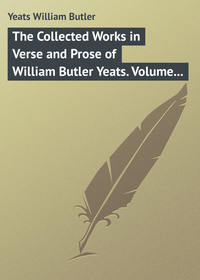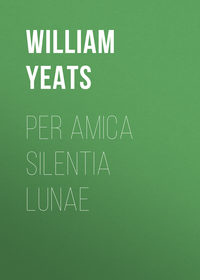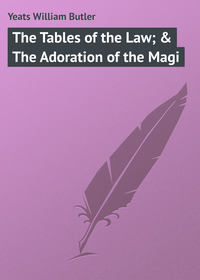 полная версия
полная версияWhere There is Nothing
Mr. Joyce. Indeed I do not.
Mrs. Ruttledge. I should think you could be cheerful without ceasing to be a gentleman.
Paul Ruttledge. You are thinking of my clothes. We must feel at ease with the people we live amongst. I shall feel at ease with the great multitude in these clothes. I am beginning to be a man of the world. I am the beggarman of all the ages – I have a notion Homer wrote something about me.
Mr. Dowler. He is either making fun of us or talking great rot. I can't listen to any more of this nonsense. I can't see why a man with property can't let well alone. Algie are you coming my way?
[They both go into the house, and come out presently with umbrella and coat.
Mr. Green. Depend upon it, he's going to write a book. There was a man who made quite a name for himself by sleeping in a casual ward.
Paul Ruttledge. Oh! no, I'm not going to write about it; if one writes one can do nothing else. I am going to express myself in life. [To Thomas Ruttledgewho has returned with box.] I hope soon to live by the work of my hands, but every trade has to be learned, and I must take something to start with. [To Mrs. Ruttledge.] Do you think you will have any kettles to mend when I come this way again?
[He has taken box from Thomas Ruttledgeand unlocked it.
Thomas Ruttledge. I can't make head or tail of what you are at.
Colonel Lawley. What he is at is fads.
Mr. Green. I don't think his motive is far to seek. He has some idea of going back to the dark ages. Rousseau had some idea of the same kind, but it didn't work.
Paul Ruttledge. Yes; I want to go back to the dark ages.
Mr. Green. Do you want to lose all the world has gained since then?
Paul Ruttledge. What has it gained? I am among those who think that sin and death came into the world the day Newton eat the apple. [To Mrs. Ruttledge, who is going to speak.] I know you are going to tell me he only saw it fall. Never mind, it is all the same thing.
Mrs. Ruttledge. [Beginning to cry.] Oh! he is going mad!
Mr. Joyce. I'm afraid he is really leaving us.
Paul Ruttledge. [Who has been looking at papers, tearing one or two, etc., takes out a packet of notes, which he puts in his breast.] I daresay this will last me long enough, Thomas. I am not robbing you of very much. Well, good-bye. [Pats him gently on the shoulder.] I mustn't forget the rabbit, it may be my dinner to-night; I wonder who will skin it. Good-bye, Colonel, I think I've astonished you to-day. [Slaps his shoulder.] That was too hard, was it? Forgive it, you know I'm a common man now. [Lifts his hat and goes out of gate. Closes it after him and stands with his hands on it, and speaks with the voice of a common man.] Go on, live in your poultry-yard. Scratch straw and cluck and cackle at everything that you take for a fox. [Exit.
Mr. Joyce. [Goes to Mrs. Ruttledge, who has sat down and is wiping her eyes.] I am very sorry for this, for his father's sake, but it may be as well in the end. If it comes to the worst, you and Thomas will keep up the family name better than he would have done.
Mr. Dowler. He'll find the poor very different from what he thinks when they pick his pocket.
Colonel Lawley. To think that a magistrate should have such fads!
Mr. Green. I venture to say you will see him here in a very different state of mind in a week.
Mr. Algie. [Who has been in a brown study.] He has done for himself in this world and the next. Why, he won't be asked to a single shoot if this is heard of.
Thomas Ruttledge. [Turning from the gate.] Here are the children, Georgina. Don't say anything before the nurse.
Mr. Green. Well, I must be off. [Goes in for stick.
Mr. Joyce. Just bring me out my coat, Green.
[They all prepare to go. Mrs. Ruttledgehas gone to open gate and children come in, one in a perambulator.All gather round them admiringly.
Mr. Joyce. Have you a kiss for godfather to-day?
Mrs. Ruttledge. The poor darlings! I hope they will never know what has happened.
Colonel Lawley. Thank goodness, they have no nonsense in their heads. We know where we are with them.
Curtain.
ACT II
Scene: By the roadside. A wall of unmortared stone in the background. Tinkers' encampment. Men, women, and children standing round. Paul Ruttledgestanding by a fire.
Paul Ruttledge. What do you mean by "tinning" the soldering iron?
Charlie Ward. If the face of it is not well tinned it won't lift the solder. Show me here.
[Takes soldering iron from Paul Ruttledge'shand.
Paul Ruttledge. [Sitting down and drawing a tin can to him.] Now, let me see how you mend this hole. It seems easy. I'm sure I will be able to learn it as well as any of you.
[Two tinkers come and stand over him.
Charlie Ward. [Pointing to one of them.] This, sir, is Tommy the Song. He's the best singer we have, but the divil a much good he is only that. He's a great warrant to snare hares.
Tommy the Song. Is the gentleman going to join us?
Paul Ruttledge. Indeed I am, if you'll let me. There's nothing I'd like better.
Tommy the Song. But are you going to learn the trade?
Paul Ruttledge. Yes, if you'll teach me. I'm sure I'll make a good tinker. Look at that now, see how I've stopped that hole already.
Charlie Ward. [Taking the can from him and looking at it.] If every can had a little hole in the middle like that, I think you would be able to mend them; but there's the straight hole, and the crooked hole, the round hole, the square hole, the angle hole, the bottom hole, the top hole, the side leak, the open leak, the leak-all-round, but I won't frighten you with the names of them all, only this I will say, that, when you've learned to mend all the leakages in a can – and that should take you a year – you're only in the first day of the tinker's week.
Tommy the Song. Don't believe him. He's only humbugging you. It's not the hardness of the work will daunt you.
Paul Ruttledge. Thank you. I was not believing him at all. I'm quite sure I'll be able to mend any can at the end of a week, but the bottoming of them will take longer. I can see that's not so easy. When will you start to teach me that, Charlie?
Charlie Ward. [As another tinker comes up.] Paddy, here's the gentleman I was telling you about. He's going to join us for good and all. [To Paul Ruttledge.] Wait till we have time and some quiet place, and he'll show you as good a cockfight as ever you saw. [A woman comes up.] This is his wife; Molly the Scold we call her; faith, she is a better fighter than any cock he ever had in a basket; he'd find it hard to shut the lid on her.
Molly the Scold. The gentleman seems foolish. Is he all there?
Paddy Cockfight. Stop your chat, Molly, or I'll hit you a welt.
Charlie Ward. Keep your tongue quiet, Molly. If the gentleman has reasons for keeping out of the way it isn't for us to be questioning him. [To Paul Ruttledge.] Don't mind her, she's cross enough, but maybe your own ladies would be cross as well if they saw their young sons dying by the roadside in a little kennel of straw under the ass-cart the way she did; from first to last.
Paul Ruttledge. I suppose you have your troubles like others. But you seem cheerful enough.
Charlie Ward. It isn't anything to fret about. Some of us go soon, and some travel the roads for their lifetime. What does it matter when we are under the nettles if it was with a short rope or a long one we were hanged?
Paul Ruttledge. Yes, that is the way to take life. What does the length of our rope matter?
Charlie Ward. We haven't time to be thinking of troubles like people that would be shut up in a house. We have the wide world before us to make our living out of. The people of the whole world are begrudging us our living, and we make it out of them for all that. When they will spread currant cakes and feather beds before us, it will be time for us to sit down and fret.
Tommy the Song. It's likely you'll think the life too hard. Would you like to be passing by houses in the night-time, and the fire shining out of them, and you hardly given the loan of a sod to light your pipe, and the rain falling on you?
Paul Ruttledge. Why are the people so much against you?
Tommy the Song. We are not like themselves. It's little we care about them or they about us. If their saint did curse us itself —
Charlie Ward. Stop. I won't have you talking about that story here. Why would they think so much of the curse of one saint, and saints so plenty?
Paddy Cockfight. Where's the good of a gentleman being here? He'll be breaking down on the road. It's on the ass-cart he'll be wanting to sit.
Tommy the Song. Indeed, I don't think he'll stand the hardship.
Paul Ruttledge. Oh, I'll stand it well enough.
Tommy the Song. You're not like us that were reared to it. You were not born like us with wandering in the heart.
Paul Ruttledge. Oh yes, I have wandering in the heart. I got sick of these lighted rooms you were talking of just now.
Charlie Ward. That might be so. It's the dark is welcome to a man sometimes.
Paul Ruttledge. The dark. Yes, I think that is what I want. [Stands up.] The dark, where there is nothing that is anything, and nobody that is anybody; one can be free there, where there is nothing. Well, if you let me stay with you, I don't think you will hear any complaints from me. Charlie Ward, Paddy, and the rest of you, I want you to understand that from this out I am one of yourselves. I'll live as you live and do as you do.
[Johneenand other children come running in.
Johneen. I was on the top of the bank and I seen a priest coming down the cross-road with his ass. It's collecting he is. We're going to set ourselves here to beg something from him.
Another Child. [Breathlessly.] And he has a whole lot of things on the ass. A whole lot of things up behind him.
Another Child. O boys, O boys, we'll have our dealing trick out of them yet. The best way'll be – [He suddenly catches sight of Paul Ruttledge.] Whist, ye divils ye, don't you see the new gentleman?
Paul Ruttledge. Speak out, boys; don't be afraid of me; I'm one of yourselves now.
Child. Oh! but we were going to – But I won't tell you. [To the other children.] Come away here, and we'll not tell him what we'll do.
Paul Ruttledge. [To Charlie Ward.] What are they going to do? They're putting their heads together.
Charlie Ward. They're going to put a bush across the road, and when the friar gets down to pull it out of the way they'll snap what they can off the ass, and away with them.
Paul Ruttledge. And why wouldn't they tell me that? Am I not one of yourselves?
Charlie Ward. Ah! It's likely they'll never trust you.
Paul Ruttledge. But they will soon see that I am one of themselves.
Charlie Ward. No; but that's the very thing, you're not one of ourselves. You were not born on the road, reared on the road, married on the road like us.
Paul Ruttledge. Well, it's too late for me to be reared on the road, but I don't see why I shouldn't marry on the road like you. I certainly would do it if it would make me one of you.
Charlie Ward. It might make you one of us, there's no doubt about that. It's the only thing that would do it.
Paul Ruttledge. Well, find a wife for me.
Charlie Ward. Faith, you haven't far to go to find one. Paddy there will give you over his wife quick enough; he won't make a hard bargain over her.
Paul Ruttledge. But I am in earnest. I want to cut myself off from my old life.
Charlie Ward. Oh! I was forgetting that.
Sabina Silver. [To Molly.] I wonder what was it he did? I wonder had he the misfortune to kill anybody?
Charlie Ward. [Calling Sabinaover.] Here's a girl should make a good wife, Sabina Silver her name is. Her father is just dead; he didn't treat her over well.
Sabina Silver. [Coming over.] What is it?
Charlie Ward. This gentleman wants to speak to you. I think he's looking out for a wife.
Sabina Silver. [Hanging her head.] Don't be humbugging me.
Paul Ruttledge. Indeed he's not, Sabina.
Sabina Silver. You're only joking a poor girl. Sure, what would make you think of me at all?
Paul Ruttledge. Sabina, have you been always on the road with Charlie Ward and the others?
Sabina Silver. I have, indeed.
Paul Ruttledge. And you'd make a good tinker's wife?
Sabina Silver. You're joking me, but I would be a better wife for a tinker than for anyone else.
Paul Ruttledge. Sabina, will you marry me?
Sabina Silver. Oh! but I'd be afraid.
Paul Ruttledge. Why, Sabina?
Sabina Silver. I'd be afraid you'd beat me.
Charlie Ward. You see her father used to beat her. She's afraid of the look of a man now.
Paul Ruttledge. I would not beat you, Sabina. How can you have got such an idea?
Sabina Silver. Will you promise me that you won't beat me? Will you swear it to me?
Paul Ruttledge. Of course I will.
Sabina Silver. [To Charlie Ward.] Will you make him swear it? Haven't you a little book in your pack? Bring it out and make him swear to me on it, and you'll be my witness.
Charlie Ward. I think, Sibby, you need not be afraid.
Sabina Silver. What's your name, gentleman?
Paul Ruttledge. My name is Paul. Do you like it?
Sabina Silver. Then I won't marry you, Mr. Paul, till you swear to me upon the book that you will never beat me with any stick that you could call a stick, and that you will never strike a kick on me from behind.
Paul Ruttledge. Charlie, go and bring out that book to satisfy her. Of course I swear that; it is absurd.
[Charlie Wardbrings the book out of his pack.
Paul Ruttledge. I swear, Sabina, that I will never strike you with any stick of any kind, and that I will never kick you. There, will that do? [He takes book and kisses it.
Sabina Silver. I misdoubt you. Kiss the book again. [Paul Ruttledgekisses it.
Charlie Ward. That's all right.
A Child. [Crying from a distance.] He's coming now, the priest's coming!
Paul Ruttledge. Then the priest will marry us. That comes in very handy.
Charlie Ward. [Scornfully.] A priest marry you, indeed he'll do nothing of the kind. I hate priests and friars. It's unlucky to get talking to them at all. You never know what trouble you're in for.
A Child. [Coming up.] That's true, indeed. The last time I spoke to a priest it's what he leathered me with a stick; may the divil fly away with him.
Paul Ruttledge. But somebody must marry us.
Charlie Ward. Of course. You'll lep over the tinker's budget the usual way. You'll just marry her by lepping over the budget the same as the rest of us marry.
Paul Ruttledge. That's all I want to know. Please marry me in whatever is your usual way.
Jerome enters, leading the ass. He carries a pig's cheek, some groceries, a string of onions, etc., on the ass, which still has its nursery trappings. He goes up to Charlie Wardthinking he is Paul Ruttledge.
Jerome. Paul, what are you doing here?
Charlie Ward. [Turning.] What do you want?
Jerome. Oh! I'm mistaken. I thought —
Paul Ruttledge. I am here, Father Jerome, but you're talking to the wrong man.
Jerome. Good God, Paul, what has happened?
Paul Ruttledge. Nothing has happened that need surprise you. Don't you remember what we talked of to-day? You told me I was too much by myself. After you went away I thought I would make a change.
Jerome. But a change like this!
Paul Ruttledge. Why should you find fault with it? I am richer now than I was then. I only lent you that donkey then, now I give him to you.
Jerome. What has brought you among such people as these?
Paul Ruttledge. I find them on the whole better company than the people I left a little while ago. Let me introduce you to —
Jerome. What can you possibly gain by coming here? Are you going to try and teach them?
Paul Ruttledge. Oh! no, I am going to learn from them.
Jerome. What can you learn from them?
Paul Ruttledge. To pick up my living like the crows, and to solder tin cans. Just give me that one I mended a while ago.
[Holds it out to Father Jerome.
Jerome. That is all nonsense.
Paul Ruttledge. I am happy. Do not your saints put all opponents to the rout by saying they alone of all mankind are happy?
Jerome. I suppose you will not compare the happiness of these people with the happiness of saints?
Paul Ruttledge. There are all sorts of happiness. Some find their happiness like Thomas à Kempis, with a little book and a little cell.
Paddy Cockfight. I would wonder at anybody that could be happy in a cell.
Paul Ruttledge. These men fight in their way as your saints fought, for their hand is against the world. I want the happiness of men who fight, who are hit and hit back, not the fighting of men in red coats, that formal, soon-finished fighting, but the endless battle, the endless battle. Tell me, Father Jerome, did you ever listen in the middle of the night?
Jerome. Listen for what?
Paul Ruttledge. Did you ever, when the monastery was silent, and the dogs had stopped barking, listen till you heard music?
Jerome. What sort of music do you mean?
Paul Ruttledge. Not the music we hear with these ears [touching his ears], but the music of Paradise.
Jerome. Brother Colman once said he heard harps in the night.
Paul Ruttledge. Harps! It was because he was shut in a cell he heard harps, maybe it sounds like harps in a cell. But the music I have heard sometimes is made of the continual clashing of swords. It comes rejoicing from Paradise.
Jerome. These are very wild thoughts.
Tommy the Song. I often heard music in the forths. There is many of us hear it when we lie with our heads on the ground at night.
Jerome. That was not the music of Paradise.
Paul Ruttledge. Why should they not hear that music, although it may not set them praying, but dancing.
Jerome. How can you think you will ever find happiness amongst their devils' mirth?
Paul Ruttledge. I have taken to the roads because there is a wild beast I would overtake, and these people are good snarers of beasts. They can help me.
Charlie Ward. What kind of a wild beast is it you want?
Paul Ruttledge. Oh! it's a very terrible wild beast, with iron teeth and brazen claws that can root up spires and towers.
Charlie Ward. It's best not to try and overtake a beast like that, but to cross running water and leave it after you.
Tommy the Song. I heard one coming after me one night; very big and shadowy it was, and I could hear it breathing. But when it came up with me I lifted a hazel rod was in my hand, and it was gone on the moment.
Paul Ruttledge. My wild beast is Laughter, the mightiest of the enemies of God. I will outrun it and make it friendly.
Jerome. That is your old wild talk. Do have some sense and go back to your family.
Paul Ruttledge. I am never going back to them. I am going to live among these people. I will marry among them.
Jerome. That is nonsense; you will soon change your mind.
Paul Ruttledge. Oh! no, I won't; I am taking my vows as you made yours when you entered religion. I have chosen my wife; I am going to marry before evening.
Jerome. Thank God, you will have to stop short of that, the Church will never marry you.
Paul Ruttledge. Oh! I am not going to ask the help of the Church. But I am to be married by what may be as old a ceremony as yours. What is it I am to do, Charlie?
Charlie Ward. To lep a budget, sir.
Paul Ruttledge. Yes, that is it, the budget is there by the wall.
Jerome. I command you, in the name of the Holy Church and of the teaching you have received from the Church, to leave this folly, this degradation, this sin!
Paul Ruttledge. You forget, Jerome, that I am on the track of the wild beast, and hunters in all ages have been a bad people to preach to. When I have tamed the beast, perhaps I will bring him to your religious house to be baptized.
Jerome. I will not listen to this profanity. [To Charlie Ward.] It is you who have put this madness on him as you have stolen his clothes!
Charlie Ward. Stop your chat, ye petticoated preacher.
Paul Ruttledge. I think, Father Jerome, you had better be getting home. This people never gave in to the preaching of S. Patrick.
Paddy Cockfight. I'll send you riding home with your face to the tail of the ass!
Tommy the Song. No, stop till we show you that we can make as good curses as yourself. That you may never be warm in winter or cold in summer time —
Charlie Ward. That's the chat! Bravo! Let him have it.
Tinkers. Be off! be off out of this!
Molly the Scold. Now curse him, Tommy.
Tommy the Song. A wide hoarseness on you – a high hanging to you on a windy day; that shivering fever may stretch you nine times, and that the curses of the poor may be your best music, and you hiding behind the door. [Jeromegoes out.
Molly the Scold. And you hiding behind the door, and squeezed between the hinges and the wall.
Other Tinkers. Squeezed between the hinges and the wall. [They follow Jerome.
Paul Ruttledge. [Crying after them.] Don't harm that gentleman; he is a friend of mine.
[He goes to the wall, and stands there silently, looking upward.
Sabina Silver. It was grand talk, indeed: I didn't understand a word of it.
Paul Ruttledge. The crows are beginning to fly home. There is a flock of them high up under that cloud. I wonder where their nests are.
Charlie Ward. A long way off, among those big trees about Tillyra Castle.
Paul Ruttledge. Yes, I remember. I have seen them coming home there on a windy evening, tossing and whirling like the sea. They may have seen what I am looking for, they fly so far. A sailor told me once that he saw a crow three hundred miles from land, but maybe he was a liar.
Charlie Ward. Well, they fly far, anyway.
Paul Ruttledge. They tell one another what they have seen, too. That is why they make so much noise. Maybe their news goes round the world. [He comes towards the others.] I think they have seen my wild beast, Laughter. They could tell me if he has a face smoky from the eternal fires, and wings of brass and claws of brass – claws of brass. [Holds out his hands and moves them like claws.] Sabina, would you like to see a beast with eyes hard and cold and blue, like sapphires? Would you, Sabina? Well, it's time now for the wedding. So what shall we get for the wedding party? What would you like, Sabina?









